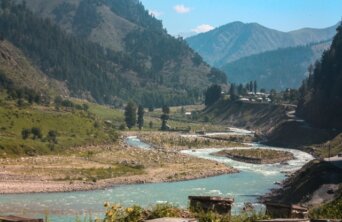- About
- Topics
- Picks
- Audio
- Story
- In-Depth
- Opinion
- News
- Donate
- Signup for our newsletterOur Editors' Best Picks.Send
Read, Debate: Engage.
| topic: | Deforestation |
|---|---|
| located: | Pakistan |
| editor: | Ishrat Ansari |
Khyber Pakhtunkhwa (KP), Pakistan’s most forested province, has been facing the problem of illegal timber cutting for several decades, and authorities have admitted that the practice is still ongoing.
According to a 2017 document by the Pakistan Forest Institute, Peshawar, the total forest area of KP is 2.043 million hectares, which accounts for about 45% of the country’s total forest area. Similarly, about 66% of the country’s coniferous forests are in the KP province.
In July this year, the then Minister for Climate Change and Environmental Coordination, Senator Sherry Rehman, acknowledged receiving reports from reliable NGOs indicating illegal tree-cutting in several areas affected in KP. The Climate Change, Forestry, and Environment Department suspended seven Khyber tribal district officials for allegedly transporting timber illegally at the Bigyari forest checkpost on September 20th.
The KP secretary, Syed Nazar Hussain Shah, for the same department, admitted to FairPlanet that he doesn’t feel the forests are fully protected but added that some activists respond to necessary deforestation unfairly.
“I accept the fact timber theft occurs in collusion with some forest department’s staff. However, our staff also trim and cut old trees, and sometimes locals cut trees for their household requirements. Some activists see the tree cutting or notice a truck loaded with trees, make videos and post them on social media, assuming timber was being smuggled,” said Shah.
To counter the challenges of global warming and deforestation, the KP government launched the Billion Trees Afforestation Project (BTAP) in 2014. The programme aims to enact a “Green Growth Initiative” in the Forestry Sector of KP.
The WWF-Pakistan independent monitoring report on the initiative states that tree survival rates are around 85-90%. After the project’s success, the government launched a nationwide campaign to plant 10 billion trees in five years in 2018.
The 2021 Khyber Pakhtunkhwa Climate Change Policy Report suggests improving capacity and creating research opportunities for assessing, planning and monitoring the rising climate challenges. The report also advises authorities to undertake concerted legal action against the timber mafia to prevent the poaching of forest timber.
A professor at the Department of Environmental Sciences, University of Peshawar, Dr. Saeeda Yousaf, emphasised that forests store atmospheric carbon dioxide, and cutting trees emits carbon dioxide, contributing to climate change.
The Khyber Pakhtunkhwa Act of 2019, the Punjab Forests Act of 1927, the Sind Forest Act of 1927, the Baluchistan Forests Act of 1980, and the Cutting of Trees (prohibition) Act of 1992 govern the management, protection, and conservation of forests in each province and are enforced by specific forest departments.
According to Shah, although timber theft is not organised in KP, the department is adopting measures to address the issue. Two months ago, the KP Forest Department signed a contract with the Space and Upper Atmosphere Research Commission (SUPARCO), under which it will provide satellite video footage of the forests to help monitor timber theft.
Image by Kamran Ch.

